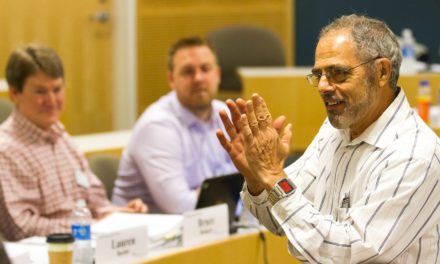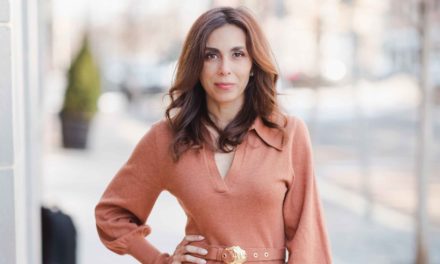Since becoming dean of the Penn State Smeal College of Business in July, Corey Phelps has made quite a splash, literally. But as he earns your attention in some surprising ways, his real talent is empowering the people around him.
In a video titled “A Five-Alarm Announcement from Dean Phelps,” Corey Phelps, the new John and Karen Arnold Dean of Penn State’s Smeal College of Business, extended an invitation to Smeal faculty and staff to join him at the Fall All-College Meeting. Simultaneously, two firefighters from the Alpha Fire Company unleashed a torrent from a firehose aimed at the side of Phelps’s head.
“They said I’d be drinking from a firehose for the first few months, but this is crazy,” Phelps shouts, with a smile.
It should be noted that Phelps directed the firefighters to point the hose at his face.
This video followed another that he made with five members of the Smeal Office of Undergraduate Education. All of them wore Star Trek costumes. Phelps played Captain Kirk.
Neither idea was his, but he happily agreed to participate in the Undergraduate Education video — which was a promotion for an upcoming staff retreat — when asked, and he picked the firehose concept over a handful of other sensible, yet staid, ideas.
“I believe leaders need to be humble and self-deprecating as a way to connect with people.” says Phelps, who took office in July. “I thought, What better way to do that than getting sprayed in the face with a firehose?”
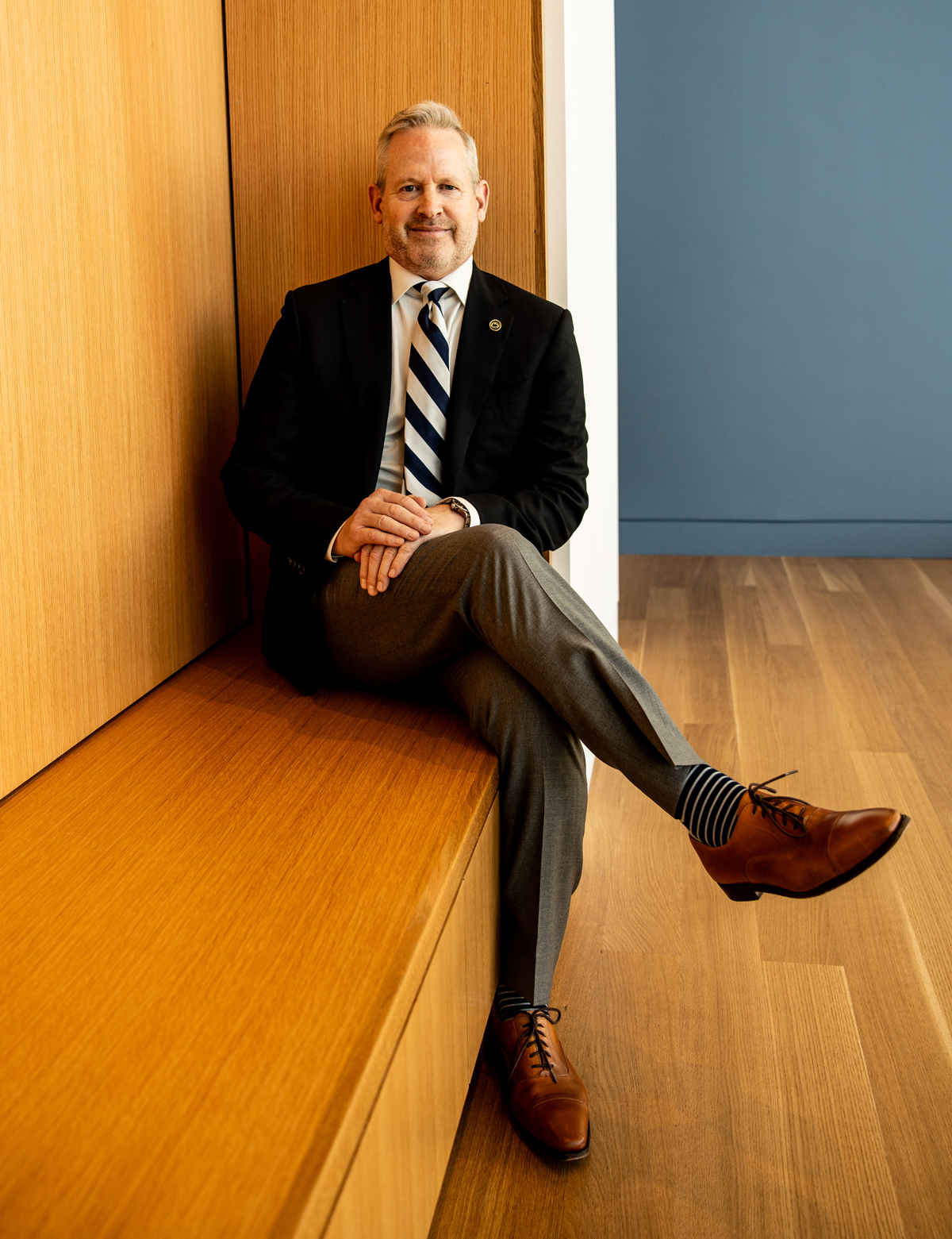
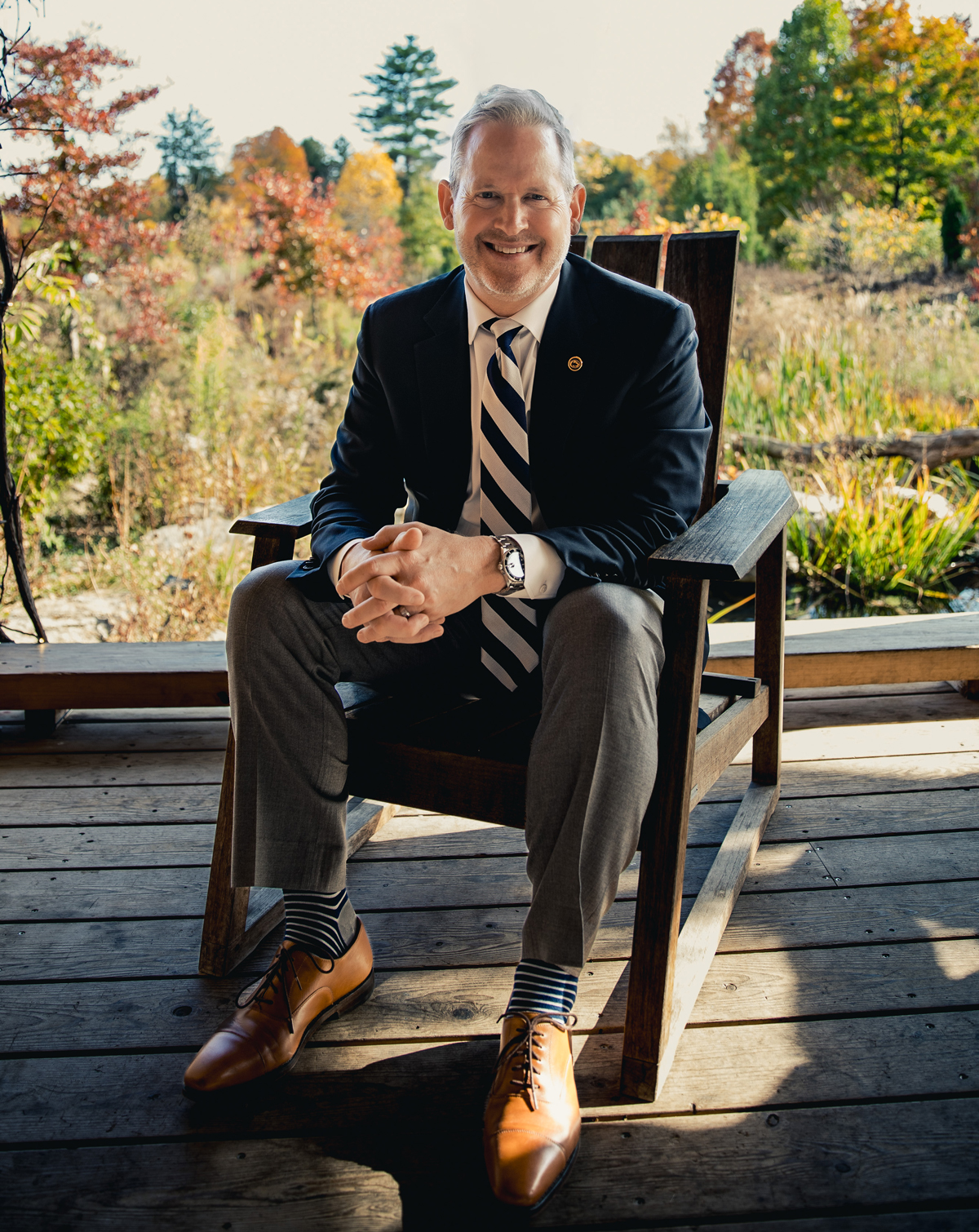
The Smeal Community has witnessed first-hand Phelps’s enthusiasm for using humor as a way to make a point.
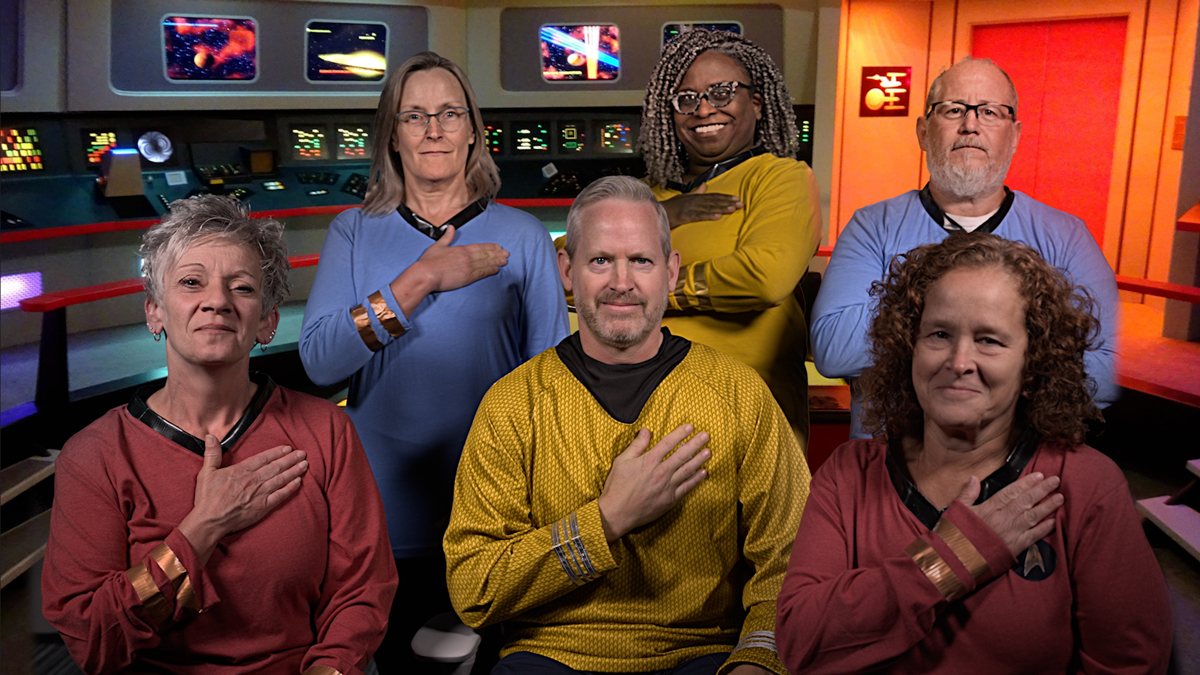
“I believe leaders need to be humble and self-deprecating as a way to connect with people.”
He also believes video is a great medium for reaching a large audience like the Smeal community. Which is to say, he’s just getting warmed up.
When Phelps told his wife, Tiffany Phelps, about the plan for him to be drenched on camera, she wasn’t surprised. This was, after all, the same man who, long before he ever aspired to be a dean, arranged a private piano recital for his students as a supplement to their discussion of a Steinway & Sons case study, since many had never seen or heard a Steinway piano.
“Now that Corey’s in administration, many people don’t get to see what an exceptional teacher he is,” Tiffany says. “His commitment to his students was the first thing that I loved about him.” Everywhere he’s taught, Phelps has made an indelible impression on students.
Pierre Dussauge, who co-taught a core strategy course in the full-time MBA program at HEC Paris with Phelps and developed executive education curricula with him there, describes Phelps as a “very energetic” teacher.
“We got along very well because he would bring ideas for new cases, new methods, new approaches,” Dussauge says. “But at the same time, he was open to suggestions, to listening to what I had to say, what worked well and not so well for me. It was a very enriching experience.”
For an executive education program at McGill University, Phelps enlisted a jazz quartet to illustrate shared leadership and nonverbal communication, according to Eric Saine, director of the McGill Executive Institute.
“He is a very dynamic and engaging teacher,” Saine says. “He is known for his creativity, his storytelling, and what I’d call an engaging presence in the classroom.”
Phelps is not a lecturer, for the most part. The courses he’s taught have generally revolved around case studies, or depictions of actual companies grappling with an actual problem. “My job, as an instructor, is to be an interrogator,” he says. “But I don’t teach classes that way. I like to have fun.”
Since becoming a dean in 2020, Phelps has continued to find creative ways to continue teaching. At Smeal, he’s planning to work with undergraduate students and be involved in executive education because it’s where his experience runs deepest. At HEC Paris, he discovered he was good at developing executive education programs and that he liked doing it. For one client, he managed a staff of five, directed 18 faculty members, and spent several weeks each year with program participants in Europe and Asia. At McGill, he was named associate dean of executive education.
As the Fred E. Brown Chair of Business and dean of the Michael F. Price College of Business at the University of Oklahoma, Phelps developed an initiative he calls “Corey in the Classroom” that was part of a larger outreach effort to rebuild the college’s community in the wake of early COVID restrictions. Here, he made himself available to faculty as a guest lecturer, providing a list of topics he could speak on or offering to discuss what it’s like to be dean.
Phelps estimates he taught about 15 such classes per semester.
“It was great because it got me in front of a wider variety of students than if I’d taught a class of my own,” he says. “These were undergraduate and graduate classes across various departments, so it really helped my accessibility and visibility at a time when I needed to connect with everyone in the college.”
In September, Phelps began planning to resume “Corey in the Classroom” in the spring semester at Smeal.
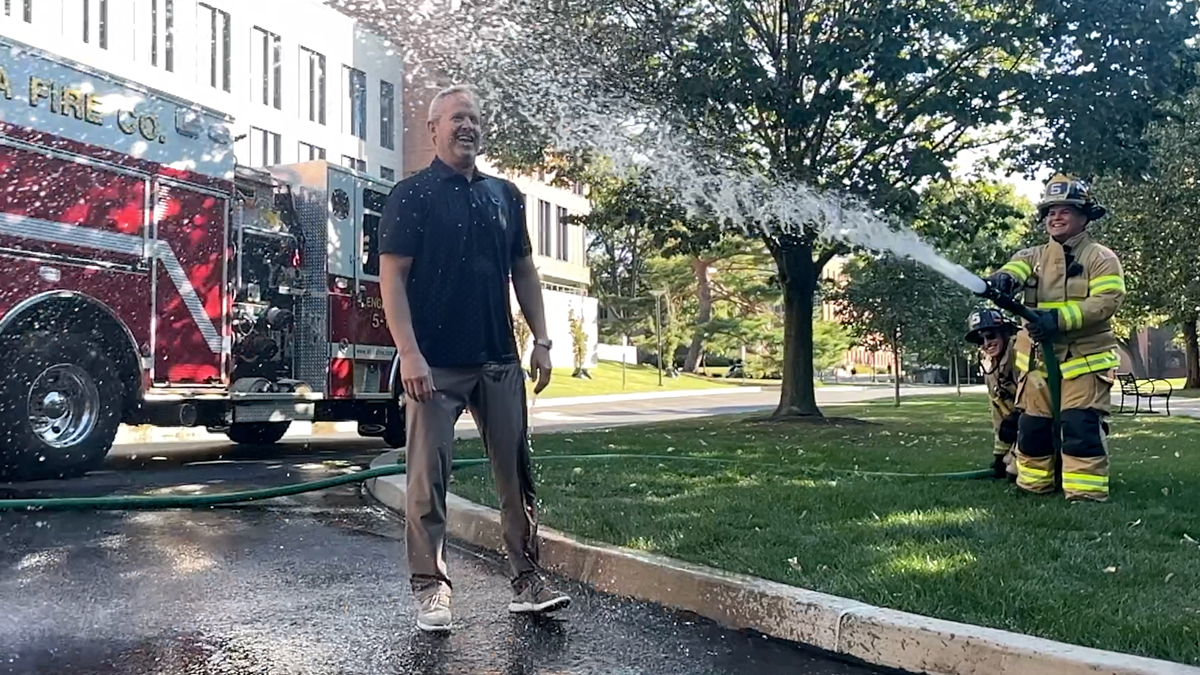
‘Family comes first’
In a decidedly more buttoned-up video that was posted in July, Phelps introduced himself as dean. He expressed a sentiment that Americans have been increasingly embracing since the start of the pandemic: “Family comes first.” When he was later asked to elaborate, Phelps admitted that he struggles with maintaining a work-life balance. Always has. Although, the issue was less pressing before he had kids.
He and Tiffany met during his first year at the University of Washington, where she worked as a fundraiser for the university and he was an assistant professor.
They married 18 years ago and had their first child, Chloé-Rose, when they lived in Paris. Their second child, Connor, followed three years later. Today, Corey and Tiffany’s lives ebb and flow in many of the same ways they do for most parents of young kids (Chloé-Rose is now 12 and Connor is 8). A recent fall weekend, for example, was jampacked with tutors, chess practice, a soccer game, a piano recital, and a Penn State football game.
“And we like it that way,” Corey says. “If there weren’t a lot of things the kids were doing on the weekend, I think I’d be tempted to work. I’m very glad that that doesn’t take place.”
“Corey’s very committed to his family,” Tiffany says. “Given how frequently we’ve moved, we’re a tight little portable unit.”
He drives Connor to school each morning. And he’s usually good, he says, about being home, and being present, for dinner during the week. He’s also not above trying to score bonus points with his kids. On a Wednesday evening in early October, Phelps made arrangements to take Connor and his best friend to a Penn State football practice.
Phelps accepts traveling as a necessary component of his job, but that doesn’t make it easier for him to be separated from his family, especially when it conflicts with once-in-a-lifetime moments. On one such occasion, a few years ago, Phelps flew home just for the night to celebrate Chloé-Rose’s birthday.
“Does my family come first?” Phelps asks. “I try very hard to make that true.”
“My approach to strategic planning isn’t taking the top executives, locking yourself in a room, and coming up with a plan. It has to be bottom up. You have to engage the entire community.”
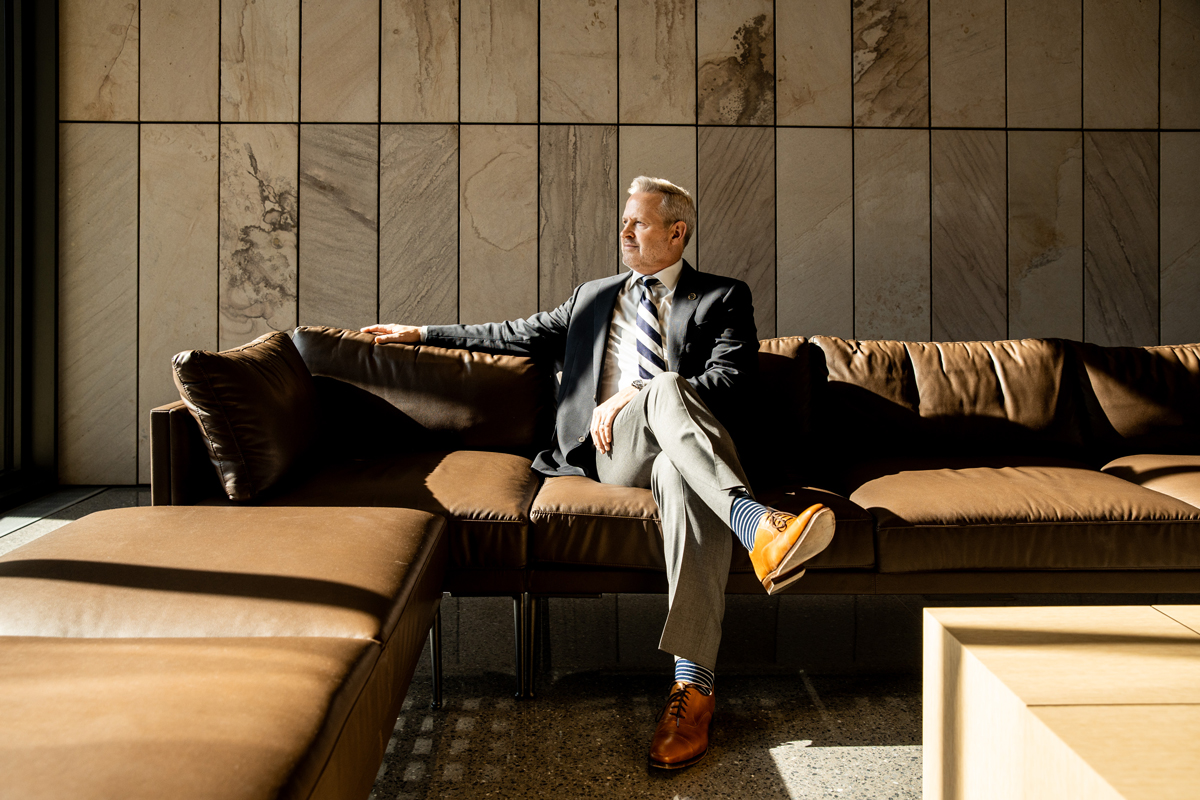
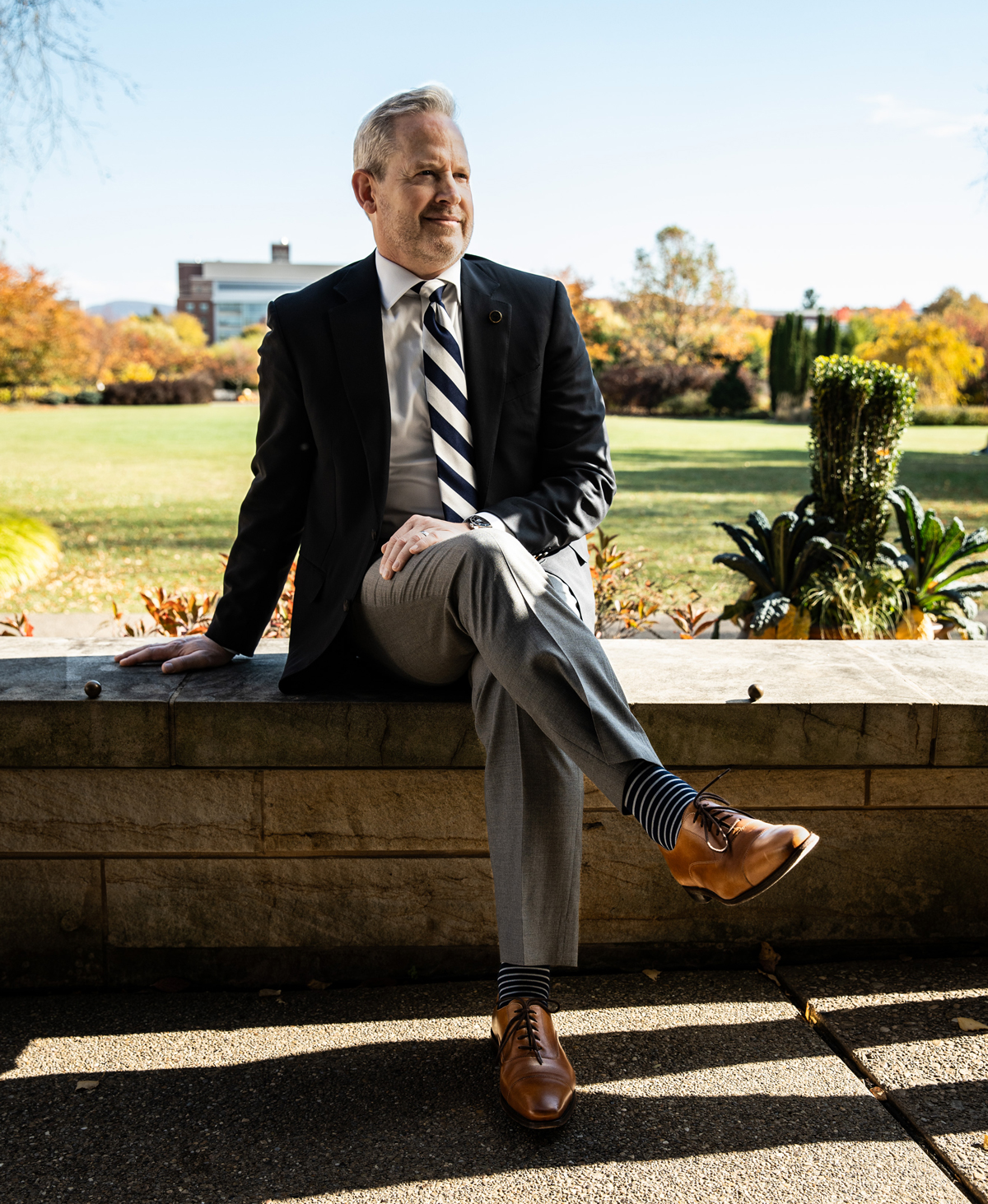
The path to Smeal
As a doctoral student at the Leonard N. Stern School of Business at New York University, Phelps quickly understood what academia “is all about,” according to his thesis advisor, Raghu Garud, who is now a professor of management and organization and the Farrell Chair in Innovation and Entrepreneurship at Smeal.
“Even as a PhD student, Corey’s interactions with others were always generative,” Garud adds.
Coming out of the program, in 2001, Phelps was a finalist for more than 10 teaching positions across the country. He accepted an offer to become an acting assistant professor of management and organization at the Michael G. Foster School of Business at the University of Washington.
Several years later, at a conference in Anaheim, Dussauge told him he thought Phelps would be a good fit for an opening at HEC Paris. Phelps quickly dismissed the idea — “I had no interest in living abroad” — but Tiffany jumped at it. Today, Phelps acknowledges the move “fundamentally changed the arc of my career.” For one, it exposed him to international businesses. It also introduced him to executive education, which, as he became more involved, led him to his first brushes with administration.
At his next stop, McGill University, in Montreal, Phelps parlayed that experience into his first deanship. He had been at McGill for nearly two years as a tenured associate professor of strategy and organization when the new dean created the position of associate dean of executive education. When she asked the faculty for its input on candidates, many shared Phelps’s name. And when the offer came, he said, “’Sure,’ not thinking at all that that’s something that I would want to do, careerwise. I just thought I’d be a good citizen, do something that I really care about, that I think I know something about and could add value to.”
A consequence of his acceptance was that he was almost immediately courted by recruiters for dean openings outside of McGill. The timing wasn’t right, though. He and Tiffany were starting a family and had little interest in moving again so soon. But in 2019, the University of Oklahoma entered the picture.
Days after accepting the deanship at Oklahoma, the country went into pandemic lockdown. Phelps says he and his family were permitted to cross the border from Canada only because of a formal letter from the Oklahoma provost.
“The job I thought I was getting into turned out to be something very different,” Phelps says.
For the first year, his days were filled entirely with virtual meetings about COVID protocols, which made developing relationships and building credibility — his priorities going in — “dramatically harder.” In time, Phelps says he became so consumed by policy that he fell completely out of touch with his faculty and students.

The “turning point,” as he describes it, came when he decided to create a new strategic plan for the college. For the first time since his arrival, he had something to focus on other than COVID. It also gave him a reason to start getting to know the people in his community.
“My approach to strategic planning isn’t taking the top executives, locking yourselves in a room, and coming up with a plan,” Phelps says. “It has to be bottom up. You have to engage the entire community.”
“Corey is not controlling,” Saine says. “Shared leadership is part of his style.”
Garud and Dussauge echoed the sentiment and added that it shouldn’t imply that he lacks standards or direction. To the contrary, Dussauge says, “He knows exactly what he’s doing, where he’s going, and what he wants. If I were to use one word, it would be determination. But at the same time, he manages to keep an open mind.”
Saine says this approach enabled Phelps to cultivate a “high-trust organization” at McGill. “A lot of what Corey is known for is his ability to grow strategically,” he says. “As a leader, in order to be committed to strategic growth, you have to trust people. Under Corey, people — including me — felt safe taking risks, expressing themselves freely, and, especially, innovating.”
For this reason, Garud believes Phelps is the appropriate person to lead Smeal into the post-Charles H. Whiteman era.
“There’s a marked shift occurring right now in terms of the pace and complexity of what a business education means,” he says. “I think a lot of business schools are struggling to make this transition because academia typically shifts very slowly. And with change, people can feel anxious.”
Phelps’s positivity and personable nature will have a reassuring effect on the Smeal community, Garud says. He already witnessed it at the All-College Meeting, he says, where Phelps introduced one of the firefighters who blasted him with the firehose, Vincent Capria, a Smeal student who volunteers with the Alphas.
“He also called out the other people who helped make the video, and he called them out by name, which I found very touching,” Garud says. “There was an excitement in the air because of it. He’s open to trying new things. Eventually, everyone — the larger Smeal community and the university at-large — will see what I mean.”

